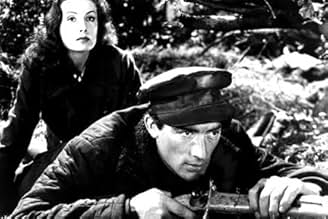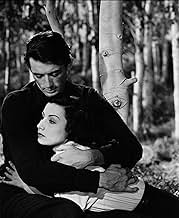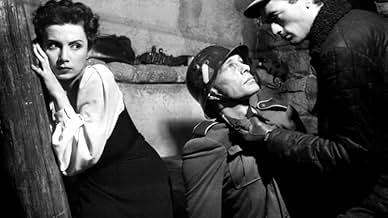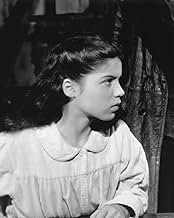NOTE IMDb
6,1/10
1,5 k
MA NOTE
Ajouter une intrigue dans votre langueA heroic guerrilla group fights back against impossible odds during the 1941 German invasion of the Soviet Union.A heroic guerrilla group fights back against impossible odds during the 1941 German invasion of the Soviet Union.A heroic guerrilla group fights back against impossible odds during the 1941 German invasion of the Soviet Union.
- Réalisation
- Scénario
- Casting principal
- Nommé pour 1 Oscar
- 3 victoires et 1 nomination au total
Tamara Toumanova
- Nina
- (as Toumanova)
Glen Vernon
- Mitya
- (as Glenn Vernon)
Edward L. Durst
- Petrov
- (as Edward Durst)
Maria Bibikov
- Vera
- (non crédité)
William Challee
- Ducrenko
- (non crédité)
Gretl Dupont
- Mariya
- (non crédité)
Charles H. Faber
- German Corporal
- (non crédité)
Erford Gage
- Col. Prilenko
- (non crédité)
Peter Helmers
- Von Rundhol
- (non crédité)
Adolf E. Licho
- Anton
- (non crédité)
Avis à la une
Gregory Peck's screen debut film playing as a Russian young fighting the Nazis during the Blitzkrieg
Patriotic Hollywood movie about a Soviet Union guerrilla when Russia was invaded by the ruthless Nazis ; subsequently , brave Guerrilleros fighting back . And presenting the motion picture debut of a cast of new personalities. The flick is set during Nazi onslaught , on June 22, 1941, the Fuehrer sent his war machine , an armored attack crashing across the frontiers of the USSR , unleashing a furious Blitzkrieg. The Fuehrer,-known his hatred for Bolshevism-, described the assault on Russia as a crusade against communism, but he obviously was motived by a need for wheat, oil, and mineral supplies to enable him to defy the British blockade. This is a flag-waving and propaganda film but at the time US and USSR were allied , it deals about some idyllic Soviet people . As their peaceful existence is brutally interrupted when they are suddenly attacked by German planes, in the first wave of the Nazi assault on the Soviet Union. As most of the men flee to the hills to form a guerrilla unit . The first part describes life of a little rebel group led by Vladimir (Gregory Peck) who falls for Ballerina Nina (Tamara Toumanova) , all of them are good people (Alan Reed , Maria Palmer ,Lowell Gilmore , Glen Verdon , Hugo Haas) who bravely fight against the violent encroachment . There happens the Nazi invasion and they're surrounded and bombed . By the way , protagonist Peck making the romantic interludes with Tamara Toumanova playing a Catholic Ballerina from Bolshoi who joins the godless guerrilla . The second part is quite starkly moving developing account of deeds that befall about the freedom fighters and when they go into action , including impressive battles . Burning with Love and Hate! A rolling wall of hell that couldn't be stopped... A handful of men who had to stop it!
The interesting and quite beautifully made film with implecable credits results to be a gripping war story dealing with the Germans overrunning the Eastern Russia with valiant , courageous villagers facing on Nazis and starring Gregory Peck/Vladimir almost single-handely battling as well as resisting the brutal enemy .This picture has presented a cast of new personalities starring , cautioning as opening credits , as closing credits . Peck making his debut as a Russian guerrilla in one of these propagandist WWII tributes to Soviet Allies which caused much embarrassment after that . In addition , there was a clutch of newcomer players . Casey Robinson's thought-provoking screenplay , based on an original story by Melchior Lengyel , is much more concerned with their doggedly upright , gallant resistence under siege than with any jingoist or political purpose . This unnerving epic depicts the horror war as Nazi atrocities and as the resistance fighters roam the Russian countryside attacking during the cruel invasion . Although melodramatic moments in overall effects, also has moments of astounding power with some overwhelming sequences. No one had much to tell for the movie by the time , but it is surprisingly convincing , intriguing , thrilling and sober . The picture has great actors , being film debut of Gregory Peck, Alan Reed ; the credits specify all in the credited cast were making their screen debuts , although Maria Palmer, Hugo Haas and Tamara Toumanova appeared in films in earlier years . This ¨Days of Glory¨ bears remarkable resemblance to ¨The North Star¨ (1943) by Lewis Milestone with prestigious actors as Walter Huston , Dana Andrews, Farley Granger , Anne Baxter, Erich Von Stroheim as usual official Nazi, Dean Jagger, among them . Cinematography is well supplied by Tony Gaudio , being filmed in Cedar City, Utah, and RKO Studios , Gower Street, Hollywood, Los Angeles, California . As well as atmospheric and evocative score by Daniele Amfitheatrof .
The motion picture was professionally directed by Jacques Tourneaur , though the film never rises above tub-thumping , and being unforced and natural , at times .Tourneur directed all kinds of genres and he was an expert on terror cinema (Cat people , Leopard man, I walked with a Zombie , Night of the demon) , Western (Wichita , Great Day in the Morning, Canyon Passage , Stranger on Horseback) , Film Noir (Berlin Express , Out of past , Nick Carter master detective) and adventures (Flame and the arrow , Marathon battle , Appointment in Honduras , Tombuctú , City under the sea) .Torneur knew the imagination was stronger than anything filmmakers could show visually and played on it with breathtaking results . Rating : 6.5/10 . Decent wartime movie . It will appeal to Gregory Peck fans .
The interesting and quite beautifully made film with implecable credits results to be a gripping war story dealing with the Germans overrunning the Eastern Russia with valiant , courageous villagers facing on Nazis and starring Gregory Peck/Vladimir almost single-handely battling as well as resisting the brutal enemy .This picture has presented a cast of new personalities starring , cautioning as opening credits , as closing credits . Peck making his debut as a Russian guerrilla in one of these propagandist WWII tributes to Soviet Allies which caused much embarrassment after that . In addition , there was a clutch of newcomer players . Casey Robinson's thought-provoking screenplay , based on an original story by Melchior Lengyel , is much more concerned with their doggedly upright , gallant resistence under siege than with any jingoist or political purpose . This unnerving epic depicts the horror war as Nazi atrocities and as the resistance fighters roam the Russian countryside attacking during the cruel invasion . Although melodramatic moments in overall effects, also has moments of astounding power with some overwhelming sequences. No one had much to tell for the movie by the time , but it is surprisingly convincing , intriguing , thrilling and sober . The picture has great actors , being film debut of Gregory Peck, Alan Reed ; the credits specify all in the credited cast were making their screen debuts , although Maria Palmer, Hugo Haas and Tamara Toumanova appeared in films in earlier years . This ¨Days of Glory¨ bears remarkable resemblance to ¨The North Star¨ (1943) by Lewis Milestone with prestigious actors as Walter Huston , Dana Andrews, Farley Granger , Anne Baxter, Erich Von Stroheim as usual official Nazi, Dean Jagger, among them . Cinematography is well supplied by Tony Gaudio , being filmed in Cedar City, Utah, and RKO Studios , Gower Street, Hollywood, Los Angeles, California . As well as atmospheric and evocative score by Daniele Amfitheatrof .
The motion picture was professionally directed by Jacques Tourneaur , though the film never rises above tub-thumping , and being unforced and natural , at times .Tourneur directed all kinds of genres and he was an expert on terror cinema (Cat people , Leopard man, I walked with a Zombie , Night of the demon) , Western (Wichita , Great Day in the Morning, Canyon Passage , Stranger on Horseback) , Film Noir (Berlin Express , Out of past , Nick Carter master detective) and adventures (Flame and the arrow , Marathon battle , Appointment in Honduras , Tombuctú , City under the sea) .Torneur knew the imagination was stronger than anything filmmakers could show visually and played on it with breathtaking results . Rating : 6.5/10 . Decent wartime movie . It will appeal to Gregory Peck fans .
A group of Soviet guerrillas operate out of a hideout behind enemy lines. Vladimir (Gregory Peck) is the heroic commander. He falls for the civilian dancer Nina Ivanova. A German soldier stumbles upon the hidden camp and is taken prisoner. Nina is horrified with Vladimir's willingness to kill a POW. When the soldier tries to escape, Nina is the one who kills him. Harden partisan Yelena is also in love with Vladimir but she is shot on a mission.
This is old fashion melodrama set in backdrop of the war. The Russians are still allies and there is a fair amount of propaganda work involved in this. The most notable is the theatrical debut of Peck. He's among several stage actors involved in this production. He's young, gaunt, and rather commanding. He enters the movie after the first fifteen minutes. Obviously, somebody would have made him the overwhelming star of the film if they knew his legendary career to come. As it is, he is the lead in an ensemble cast.
This is old fashion melodrama set in backdrop of the war. The Russians are still allies and there is a fair amount of propaganda work involved in this. The most notable is the theatrical debut of Peck. He's among several stage actors involved in this production. He's young, gaunt, and rather commanding. He enters the movie after the first fifteen minutes. Obviously, somebody would have made him the overwhelming star of the film if they knew his legendary career to come. As it is, he is the lead in an ensemble cast.
Pray silence, workers and peasants, for a "cast of new personalities" headed by the debut of "Mr Gregory Peck, distinguished actor on the New York stage".
A suitably solemn intro for the late Mr P, who supplies a characteristically cigar-store-Indianesque turn as the darkly handsome Russian dam-builder turned train-buster, heading a WW2 band of partisans (i.e., terrorists). His stern Soviet soul is melted only by a sultry ballerina who is stranded with the gang. Other members include a comic peasant double act, a learned Oxonian sidekick and a winsome teen brother and sister, one of whom ends on a Nazi noose (the wrong one, given the girl's saccharine performance).
This retrospectively hilarious and morally objectionable whitewashing of the most murderous tyranny in history- the communist USSR- fudges its politics like all the Hollywood "enemy of my enemy is my friend" wartime propaganda pieces. "Socialism" as the Peck character's creed is never mentioned. Inspiration for the partisans' efforts is made out to be no more than a worthy resentment of trespassers on their home ground, whether it's a dictatorship or not. (By the same logic Hollywood should now be shooting films justifying Iraqi guerilla resistance to the Americo-British occupation, but don't hold your breath.) The unpalatable truth that many in the western Soviet Union welcomed and collaborated with the Germans has to be evaded. In this flick, solidarity is absolute.
Apart from this hollowness at the core, the film is a decent string of shoot-em-ups in a convincingly icy studio landscape. The stage actors in the cast were and remained unfamiliar, making the thing seem a mite more authentic than, say, "For Whom the Bell Tolls". But Ms Toumanova, the producer's girlfriend at the time, conceives emotional acting as gazing into the remote distance with her lips slightly parted: the influence of Garbo was disastrous! And it would take Selznick and King Vidor to extract a full-blooded performance from Peck, in "Duel in the Sun". It's curious, incidentally, that Casey Robinson, writer and producer of this paean to Stalin, never got serious heat from the House Un-American Activities Committee after the war. Did he cut a deal?
A suitably solemn intro for the late Mr P, who supplies a characteristically cigar-store-Indianesque turn as the darkly handsome Russian dam-builder turned train-buster, heading a WW2 band of partisans (i.e., terrorists). His stern Soviet soul is melted only by a sultry ballerina who is stranded with the gang. Other members include a comic peasant double act, a learned Oxonian sidekick and a winsome teen brother and sister, one of whom ends on a Nazi noose (the wrong one, given the girl's saccharine performance).
This retrospectively hilarious and morally objectionable whitewashing of the most murderous tyranny in history- the communist USSR- fudges its politics like all the Hollywood "enemy of my enemy is my friend" wartime propaganda pieces. "Socialism" as the Peck character's creed is never mentioned. Inspiration for the partisans' efforts is made out to be no more than a worthy resentment of trespassers on their home ground, whether it's a dictatorship or not. (By the same logic Hollywood should now be shooting films justifying Iraqi guerilla resistance to the Americo-British occupation, but don't hold your breath.) The unpalatable truth that many in the western Soviet Union welcomed and collaborated with the Germans has to be evaded. In this flick, solidarity is absolute.
Apart from this hollowness at the core, the film is a decent string of shoot-em-ups in a convincingly icy studio landscape. The stage actors in the cast were and remained unfamiliar, making the thing seem a mite more authentic than, say, "For Whom the Bell Tolls". But Ms Toumanova, the producer's girlfriend at the time, conceives emotional acting as gazing into the remote distance with her lips slightly parted: the influence of Garbo was disastrous! And it would take Selznick and King Vidor to extract a full-blooded performance from Peck, in "Duel in the Sun". It's curious, incidentally, that Casey Robinson, writer and producer of this paean to Stalin, never got serious heat from the House Un-American Activities Committee after the war. Did he cut a deal?
(Some Spoilers) Despite the high hopes and bombastic claims by Adolf Hitler and the German High Command about achieving a swift and total victory in the invasion of the Soviet Union by Hitler's Wehrmacht which racked up spectacular results in the summer and fall of 1941. As cold and freezing weather set in the invading Axis forces started to bog down due to the severe Russian winter and stubborn and fanatical Soviet resistance. By the Red Army on the front lines and the Russian partisan bands behind them.
The Russian partisans were groups of lightly armed but highly motivated and disciplined men and women who ambushed German, and their allies, troops and disrupted the German supply and lines of communications. From the start of the war with the USSR on June 21, 1941 to when the German Army was finally driven out of Russia in the early spring of 1944 Russian partisans inflected over 500,000 casualties on the German army and it's allies. The film "Days of Glory" is about one of these Russian partisan bands, operating out of the swamps marshes and forests around the town of Yasnaya Polyana in Central Russia, led by Soviet Red Army officer Vladimir (Gregory Peck).
Far better then most movies made by Hollywood during WWII "Days of Glory" didn't overdo the Russian heroics as well as the evil and viciousness of the invading Germans. The bravest thing that happened in the movie, in regard to the Russian partisans, was when young Mitya, Glen Veron, was captured by the German Army. When Mitya was about to be executed he had a smile on his face and defiance in his voice, toward his German executioners, as he was hung in the town square.
The Germans for their part were brutal and ruthless to the Russian people that they were in control of. Non the less the Germans weren't as bad as in movies like "The North Star". Where they drained out the blood, like vampires, of the Russian villagers to be used to treat wounded German soldiers, with badly needed blood-transfusions. Or even like in the film "Till We Meet Again" where they, the Germans, raped and inducted Catholic Nuns into brothels to serve and entertain the German Army.
The movie has a very sad and touching love story with Vladimir and the two women who were in love with him Yelena & Nina, Maria Palmer & Tamara Toumanova, and resulted in one of them getting killed by the Germans. Leaving the other feeling guilty, and in a way responsible, about what happened to her. Yelena was a hardened guerrilla fighter who killed over 60 German soldiers during the war. Nina was a sweet sensitive and no-violent young women who was a star dancer in the Russian Bellet before the war began and a Russian guerrilla fighter after it started.
Even though the war action in "Days of Glory" was very sparse when it did come on the screen it was awesome. With a spectacular German ammunition train explosion and a tremendous shoot-out with the attacking German Army, at the very end of the movie. With the Russian Partisans, led by Vladimir and Nina, fighting for their lives with mostly home-made guns and grenades against German tanks planes and artillery pieces. "Days of Glory" did in no way celebrate the brutal Joeseph Stalin regime that ran Russia during WWII as well as before and after the war. In fact I don't remember hearing even once "Comrad Stalin's" name mentioned in the movie.
The film "Days of Glory" was about a people, the Russian people, raising up against an invader and fighting him with everything that they had at their disposal, as meager as it was; in order to drive him, the Germans, out of their homes and land for good and forever.
The Russian partisans were groups of lightly armed but highly motivated and disciplined men and women who ambushed German, and their allies, troops and disrupted the German supply and lines of communications. From the start of the war with the USSR on June 21, 1941 to when the German Army was finally driven out of Russia in the early spring of 1944 Russian partisans inflected over 500,000 casualties on the German army and it's allies. The film "Days of Glory" is about one of these Russian partisan bands, operating out of the swamps marshes and forests around the town of Yasnaya Polyana in Central Russia, led by Soviet Red Army officer Vladimir (Gregory Peck).
Far better then most movies made by Hollywood during WWII "Days of Glory" didn't overdo the Russian heroics as well as the evil and viciousness of the invading Germans. The bravest thing that happened in the movie, in regard to the Russian partisans, was when young Mitya, Glen Veron, was captured by the German Army. When Mitya was about to be executed he had a smile on his face and defiance in his voice, toward his German executioners, as he was hung in the town square.
The Germans for their part were brutal and ruthless to the Russian people that they were in control of. Non the less the Germans weren't as bad as in movies like "The North Star". Where they drained out the blood, like vampires, of the Russian villagers to be used to treat wounded German soldiers, with badly needed blood-transfusions. Or even like in the film "Till We Meet Again" where they, the Germans, raped and inducted Catholic Nuns into brothels to serve and entertain the German Army.
The movie has a very sad and touching love story with Vladimir and the two women who were in love with him Yelena & Nina, Maria Palmer & Tamara Toumanova, and resulted in one of them getting killed by the Germans. Leaving the other feeling guilty, and in a way responsible, about what happened to her. Yelena was a hardened guerrilla fighter who killed over 60 German soldiers during the war. Nina was a sweet sensitive and no-violent young women who was a star dancer in the Russian Bellet before the war began and a Russian guerrilla fighter after it started.
Even though the war action in "Days of Glory" was very sparse when it did come on the screen it was awesome. With a spectacular German ammunition train explosion and a tremendous shoot-out with the attacking German Army, at the very end of the movie. With the Russian Partisans, led by Vladimir and Nina, fighting for their lives with mostly home-made guns and grenades against German tanks planes and artillery pieces. "Days of Glory" did in no way celebrate the brutal Joeseph Stalin regime that ran Russia during WWII as well as before and after the war. In fact I don't remember hearing even once "Comrad Stalin's" name mentioned in the movie.
The film "Days of Glory" was about a people, the Russian people, raising up against an invader and fighting him with everything that they had at their disposal, as meager as it was; in order to drive him, the Germans, out of their homes and land for good and forever.
Gregory Peck is the leader of a group of Russian Guerillas who are fighting the invading Nazis. Peck is the leader of the group but there isn't that many people in the group, they even have a teenager and his younger sister helping out. They also have a woman sharpshooter and several other members. They go out at night to do some damage and hide out by day. They take in a ballet dancer who doesn't want to kill but winds up killing an escaping Nazi. Peck and the dancer end up falling in love and have several love scenes together. They blow up an ammunition train and they also have to hold off some Nazis when the Russians want to do a counter-attack. This was Gregory Peck's first film but this wasn't his best film.
Le saviez-vous
- AnecdotesFilm debut of Gregory Peck.
- Crédits fousOpening credits: Presenting the motion picture debut of a cast of new personalities.
- ConnexionsFeatured in American Masters: A Conversation with Gregory Peck (1999)
Meilleurs choix
Connectez-vous pour évaluer et suivre la liste de favoris afin de recevoir des recommandations personnalisées
- How long is Days of Glory?Alimenté par Alexa
Détails
Box-office
- Budget
- 958 000 $US (estimé)
- Durée1 heure 26 minutes
- Couleur
- Rapport de forme
- 1.37 : 1
Contribuer à cette page
Suggérer une modification ou ajouter du contenu manquant

Lacune principale
By what name was Jours de gloire (1944) officially released in India in English?
Répondre






























